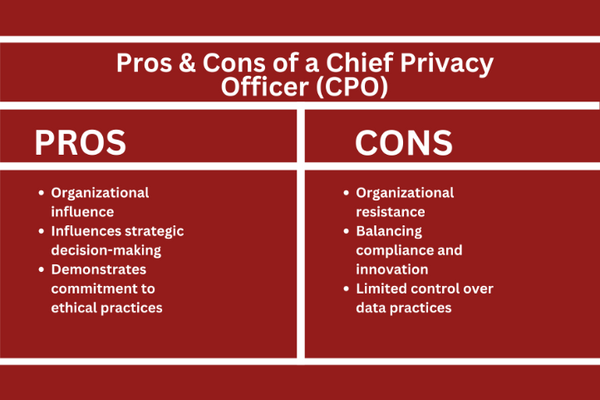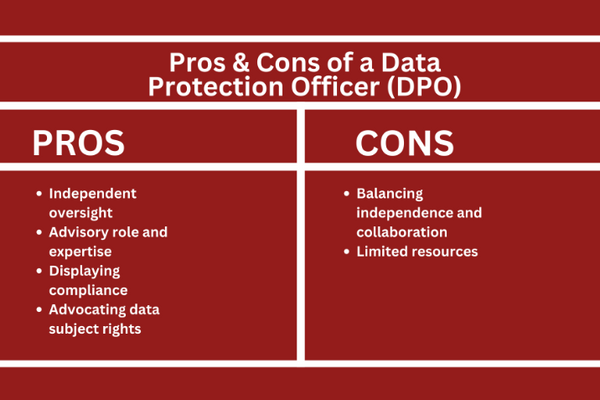Captain Compliance works with Chief Privacy Officers from hundreds of companies and gets to learn about how each organization structures and handles it’s privacy operations. If you’re a CPO or a DPO looking for data privacy software solutions to ensure privacy compliance while also automating the tasks that you may be doing manually. We welcome the opportunity to save you time and provide you with the best customer service to not only meet but to exceed your data governance needs for your company.

In today’s highly regulated corporate environment, businesses often appoint a chief privacy officer (CPO) or a data protection officer (DPO) to ensure legal compliance and mitigate risks. You can also use a 3rd party solution and software like the tools developed here at Captain Compliance to handle a lot of the requirements with ease. For now lets explain the differences between a DPO and a CPO so you can decide if you need to hire one, both, or none.
So what exactly do these roles entail? How are they different? And which is right for you?
Whether you’re a legal professional looking to understand CPOs and DPOs or a business owner contemplating which expert to hire, you’re in the right place.
This article will explore the unique organizational functions of CPOs and DPOs and highlight their most significant differences.
Let’s dive right in!
What is a Chief Privacy Officer (CPO)?

A chief privacy officer (CPO) is a high-level executive responsible for overseeing an organization’s privacy program and ensuring compliance with all applicable privacy regulations. CPOs are also known as “privacy officers” or “privacy leaders.”
While the specific responsibilities of a CPO vary depending on an organization’s size, industry, and applicable laws, all CPOs play a pivotal role in protecting digital privacy and sensitive personal information.
In practice, the responsibilities of a Chief Privacy Officer within an organization are as follows:
Oversee data protection program: The CPO supervises an organization’s corporate compliance and data protection program. They ensure policies, procedures, and controls are in place to protect personal information effectively.
Privacy program management: The CPO regulates privacy policies, processes, governance, and protocols to ensure conformity to applicable laws.
Data protection policies: The CPO collaborates with other departments to create and enforce policies that define how sensitive data should be handled, transferred, and destroyed within the organization.
Privacy training and awareness: The CPO educates employees about data privacy best practices through training sessions, workshops, and informational materials. This helps foster a culture of privacy awareness within the organization.
Privacy impact assessments (PIAs): The CPO conducts privacy impact assessments to evaluate the risks and impacts of new projects, systems, or processes on data privacy.
Incident response and breach management: In the event of a data breach or privacy incident, the CPO leads the organization’s response efforts. They coordinate incident investigations, notify affected parties as required by law, and set up safeguards to prevent future incidents.
Privacy advocacy: The CPO represents the business’s interests in matters related to data privacy. They remain up-to-date on new privacy laws and industry standards, engage with regulators and media, and advocate for privacy-conscious practices.
Privacy by design: The CPO promotes the concept of “Privacy by Design” throughout the organization. They collaborate with IT, legal, marketing, and product development teams to integrate privacy principles into the design and development of new products and services.
Respond to privacy complaints and inquiries: CPOs also investigate and respond to consumers’ complaints and questions about their privacy rights.
Want to hire an effective yet cost effective chief privacy officer? Get in touch for a free consultation about how our privacy software solutions can protect your business against the newest state privacy laws and big dollar fines that GDPR doles out for violations.
What is a Data Protection Officer (DPO)?

A data protection officer (DPO) is an independent privacy professional who ensures that an organization complies with data protection regulations. A DPO can either be an internal employee or an external privacy consultant. Plus, they typically have a background in law, information technology, or privacy.
DPOs primarily advise businesses on best practices for safeguarding data and upholding ethical privacy standards. They report directly to the highest management level and must operate without conflicts of interest.
Unlike CPOs, DPOs are typically required by law for public sector organizations and businesses that process large amounts of personal and sensitive information.
Appointing a DPO is mandatory for most businesses under the General Data Protection Regulation (GDPR), Brazil’s Lei Geral de Proteção de Dados (LGPD), and Singapore’s Personal Data Protection Act (PDPA).
Within organizations, DPOs have the following duties:
- Informs and advises on data protection laws: The DPO informs businesses on best practices for compliance with relevant data privacy regulations, most especially the GDPR. They also stay updated on the latest legal requirements and help businesses interpret and apply them correctly.
- Monitor compliance with privacy laws: The DPO actively monitors compliance through internal audits and assessments to identify areas of improvement.
- Act as a liaison between the organization and data protection authorities: As an impartial advisor, the DPO is the primary point of contact for interactions with data protection authorities. For instance, they may assist in reporting data breaches or collaborating with regulatory agencies during investigations.
- Conduct Data Protection Impact Assessments (DPIAs): DPIAs are assessments carried out to evaluate the impacts of new activities on data protection. The DPO typically leads this process, uncovering privacy vulnerabilities and recommending measures to minimize risks.
- Respond to privacy complaints and inquiries: The DPO addresses consumers’ privacy-related questions and complaints. They handle issues promptly, investigate alleged breaches or incidents, and take decisive actions to resolve them.
- Work with stakeholders to ensure data privacy: The DPO collaborates with various departments, like HR, marketing, and legal, to integrate data privacy requirements into their systems. For instance, DPOs may collaborate with the IT department to establish data encryption protocols.
Think data protection officers are the right move for your business? Click here for a free consultation.
Chief Privacy Officer (CPO) vs. Data Protection Officer (DPO)
Although the duties of CPOs and DPOs may occasionally overlap, both positions differ considerably. Understanding these differences is vital for businesses to allocate responsibilities effectively.
Here are the significant differences between these two roles:
Role and Independence
A CPO is an internal executive who oversees privacy strategies, policies, and compliance frameworks. They work closely with senior management and align privacy practices with the organization’s objectives and welfare.
On the other hand, a DPO is an independent position mandated by data protection laws. DPOs act as neutral authorities to protect data subjects’ rights, monitor compliance, and advise on privacy matters.
For example, in a large multinational technology company, the CPO would be responsible for developing the company’s privacy strategy. In contrast, the DPO would ensure compliance with relevant privacy laws, acting as an independent advisor to the organization.
Strategic Focus and Scope of Responsibility
CPOs have a broader and more strategic focus compared to DPOs. They integrate privacy practices into the business’s overall strategy, culture, and long-term planning.
They also proactively identify opportunities to enhance privacy protections, audit compliance, and drive privacy innovation within the organization.
Moreover, CPOs have a broader scope of responsibility that encompasses not only consumer data protection but also employee privacy and general corporate governance.
Skill Set and Expertise
CPOs must understand privacy laws, regulations, and industry best practices to be effective. However, their positions are more flexible as they can come from various backgrounds. As such, CPOs must be highly adaptable individuals and excellent communicators.
In contrast, DPOs need a broader skill set, including profound knowledge of data protection laws, risk assessment methodologies, and compliance management. They must understand the intricacies of different privacy requirements across multiple fields. As a result, DPOs are typically expected to have a background in law and IT.
Ultimately, the distinct skill sets of CPOs and DPOs allow organizations to engage the right expert for specific data protection duties.
Reporting Structure
CPOs often report to senior management or executive-level positions within the organization. They work closely with stakeholders across departments to implement privacy initiatives to enhance corporate welfare.
DPOs, however, report directly to the highest levels of governance, including supervisory authorities. This reporting independence strengthens the DPO’s ability to provide unbiased advice and maintain transparency.
For instance, in a large retail corporation, the CPO might report to the Chief Legal Officer (CLO), whereas the DPO would report directly to the Board of Directors.
External Communication
CPOs often act as the organization’s spokesperson on privacy-related matters. They represent the organization’s privacy commitments to consumers, regulators, and the public. They may also build relationships with external stakeholders.
Conversely, DPOs focus more on internal advisory duties, primarily supporting internal stakeholders in privacy compliance and advocating for data subject rights.
Pros & Cons of a Chief Privacy Officer (CPO)

The pros and cons a CPO experiences depend on the specific circumstances of a business’s operations. That said, a CPO’s role typically features the following benefits and drawbacks:
Pros
Organizational influence: CPOs are afforded a seat at the table when it comes to privacy-related decisions. They work closely with senior management, legal teams, and other prominent stakeholders to shape privacy practices.
Influences strategic decision-making: Businesses gain privacy expertise and insights that can shape their corporate strategies by involving a CPO in strategic discussions.
Demonstrates commitment to ethical practices: Having a CPO displays a dedication to ethical data management and responsible business practices.
Cons
Organizational resistance: Overcoming resistance and changing established practices may require considerable effort and negotiation from CPOs.
Balancing compliance and innovation: Striking the right balance between compliance and innovation can be difficult, as CPOs must consider privacy requirements without disrupting business operations.
Limited control over data practices: CPOs may have limited control when decision-making authority lies with other departments. Collaboration and effective communication with other teams become vital to deploy privacy enhancements.
Pros & Cons of a Data Protection Officer (DPO)

Here are the most significant merits and demerits of a DPO’s role:
Pros
Independent compliance oversight: Thanks to their independence, DPOs are impartial authorities, safeguarding individuals’ rights and providing unbiased compliance oversight.
Advisory role and expertise: DPOs provide expert guidance on privacy matters. They are a knowledgeable resource, offering insights on data protection best practices and other important privacy considerations.
Displaying compliance to regulatory authorities: A DPO helps businesses show data protection compliance to regulatory authorities, reducing the risk of fines and legal exposure.
Advocating data subject rights: A DPO prioritizes effectively facilitating consumer privacy rights, including access, disclosure, and deletion requests.
Cons
Balancing independence and collaboration: DPOs must delicately balance their independent position and collaborating with other departments, as they rely on support from various stakeholders to implement privacy practices effectively.
Limited resources: Obtaining the necessary resources, including budget, technology, and personnel to deploy comprehensive privacy initiatives, may sometimes be challenging for DPOs.
FAQs
What is the primary difference between a Chief Privacy Officer (CPO) and a Data Protection Officer (DPO)?
The principal difference is in their scope and focus. A CPO’s role is broader, strategic, and aligned with organizational objectives and welfare.
On the other hand, a DPO is independent and performs more of an advisory function, ensuring compliance with applicable data protection laws.
Does every business need both a CPO and a DPO?
It depends on the business and its legal or regulatory obligations. Some businesses may choose to have a single person in both positions, while others may appoint separate individuals. It’s important to consider the unique requirements to determine your needs for either role.
Is the position of a CPO/DPO only relevant to large organizations?
No, these positions are relevant to organizations of all sizes. Data protection and privacy are critical considerations regardless of a business’s scale.
Small businesses, startups, and nonprofits can benefit from appointing a CPO, DPO, or a similar compliance service to ensure regulatory adherence and develop solid reputations.
Can a CPO or DPO be held personally liable for non-compliance or data breaches?
While personal liability can vary depending on local laws and specific circumstances, the primary responsibility for non-compliance or data breaches usually lies with the business. However, CPOs and DPOs can face professional consequences if they are found to have acted negligently or failed to fulfill their responsibilities.
Are there specific qualifications or certifications required for CPOs and DPOs?
There are no universal qualifications or certifications, but having a solid background in privacy laws, data protection, and information security is beneficial. Certifications like Certified Information Privacy Professional (CIPP) and Certified Data Protection Officer (CDPO) can demonstrate expertise in both positions.
How can a CPO or DPO effectively collaborate with other departments?
CPOs and DPOs must establish open communication lines with legal, IT, HR, and other relevant departments. Regular meetings, training sessions, and clear communication about privacy requirements help ensure that privacy considerations are integrated into the business’s practices. As more states in 2026 pass privacy laws that are similar to GDPR’s requirements you’ll see more and more positions popping up on job boards and linkedin posts asking for help.
How Can Captain Compliance Help?
At Captain Compliance, we offer outsourced DPO and CPO services for your business. Whether you need assistance establishing a privacy strategy, ensuring compliance with data protection laws, or improving your privacy practices, we’ve got you covered.
Our personalized solutions are designed to cater to your unique needs, empowering you to protect individuals’ privacy rights, foster trust, and mitigate risks.
Ready to engage a trusted partner in navigating the complex world of privacy and data protection? Get in touch today for a free consultation for your business!